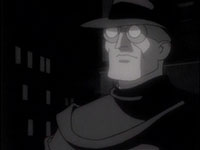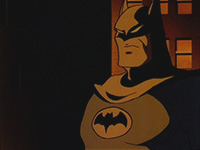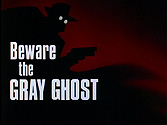|
 At
the time they originally aired, of course, there were probably no two
shows less likely to be confused with each other than the William Shatner
Star Trek and the Adam West Batman. One was an earnest,
even preachy, exemplar of pious American liberalism; the other was a pop
parody, a camp sendup of America's cheez-whiz culture. One championed
enlightenment as the highest form of wisdom; the other championed knowingness
and irony. Not least, one was a ratings smash and the other a basement-dweller. At
the time they originally aired, of course, there were probably no two
shows less likely to be confused with each other than the William Shatner
Star Trek and the Adam West Batman. One was an earnest,
even preachy, exemplar of pious American liberalism; the other was a pop
parody, a camp sendup of America's cheez-whiz culture. One championed
enlightenment as the highest form of wisdom; the other championed knowingness
and irony. Not least, one was a ratings smash and the other a basement-dweller.
And yet, filtered
retrospectively through thirty years of nostalgia and haze, how easily
the two shows can be confused with each other, not least because of the
way the two lead actors merge in one's imagination. William Shatner and
Adam West. Have there ever been two bigger stars with less talent? Big,
meaty hams both, broad of gesture, clipped of speech, and prone to the
oddly . . . punctuated phrase. And each perfectly suited to roles that,
again in hazy retrospect, merge together. James Kirk and Bruce Wayne:
Privileged, technocratic cowboys, earnest, avuncular, and zealously devoted
to the cause of justice, liberty, and technological superiority over their
foes. We're talking John Wayne territory here, folks, the man with the
broad swaggering stride and biggest shotgun in the West. So maybe it is
the way that each tries to step into the Duke's enormous boots that leaves
us thinking of Shatner and West as mere stylistic variants on each other.
Of course, they grasped
at Wayne's mantle with different purposes, Star Trek to wrap itself
in it, Batman to trample it into the dust. Wayne of course was
a famous reactionary, a man devoted to the single thought that evil must
be vanquished, and whose intellect was too coarse to trouble over shades
of gray. American liberalism at its Vietnam/Great Society apogee of arrogance
struck much the same pose, even if it set its face against different evils,
and Star Trek optimistically extrapolated the same outlook into
the future. But Batman saw through the pose and mocked the grandiloquent
heroics: Batman, after all, was a joke, and Batman was its butt.
And Batman
set the tone for what came next, of course; for thirty years the tide
has run strongly toward jeering at "heroes." That may partly
explain why Shatner and West, for all their similarities, are esteemed
so differently, with one held in contempt while the other is coddled.
West never presented himself as worth looking up to, so we're grateful
he spares us the effort of tearing him down.
How ironic, then,
that "Beware the Gray Ghost," an episode that has Adam West
playing the lead actor in an iconic television show, should be so devoid
of irony. The Gray Ghost is a Kirk figure, the granite-jawed defender
of rectitude, and Simon Trent is its Shatner, the actor trapped by a career-defining
role. This is a ripe target for sociological satire, an opportunity to
discover anew how short of expectations our heroes actually stand, and
a chance to relax with the complacent knowledge that, really, no one is
superior to the savvy media child who smugly sees through all appearances.
 And, thank heavens
above, we are spared it. For while "Beware the Gray Ghost" recognizes
how shy of grandeur is the real Simon Trent, it does so not by mocking
him but by humanizing him. It knows that in truth there are no "heroes,"
not because there is no such thing as heroism but because heroic acts
are always practiced by mere mortals doing the best they can under trying
circumstances and who return again and again to the fight. Or, to put
it another way, it knows that heroes are actors who hope to grow into
the role and never give up even when they know they can never fully succeed.
Instead, it turns a satirical eye on the "smart" crowd, making
its villain one of those savvy creatures who esteem an icon like the Gray
Ghost not for the ideals he exemplifies but for his kitsch value—an
ironist whose love of toys is finally only destructive. And, thank heavens
above, we are spared it. For while "Beware the Gray Ghost" recognizes
how shy of grandeur is the real Simon Trent, it does so not by mocking
him but by humanizing him. It knows that in truth there are no "heroes,"
not because there is no such thing as heroism but because heroic acts
are always practiced by mere mortals doing the best they can under trying
circumstances and who return again and again to the fight. Or, to put
it another way, it knows that heroes are actors who hope to grow into
the role and never give up even when they know they can never fully succeed.
Instead, it turns a satirical eye on the "smart" crowd, making
its villain one of those savvy creatures who esteem an icon like the Gray
Ghost not for the ideals he exemplifies but for his kitsch value—an
ironist whose love of toys is finally only destructive.
Of course, BTAS is
itself a show in the mode of "The Gray Ghost" and could hardly
shoot spitballs without casting an uneasy glance over its own shoulder
at its own audience. But it makes no special pleas on its own behalf by
softening its characters. Simon Trent is far from an admirable human being—he's
selfish, peevish and easily frightened—and Batman says hard things
with no intention of ever retracting them. The argument is not for pity
but for understanding, the recognition that before we can appreciate the
greatness that human beings are capable of we must appreciate how rotten
and callow they can really be. Before anything fine and straight can be
made of it, you must see just how crooked the timber really is.
Such is the architecture
of the script, but it is West's presence that makes the episode breathe.
Probably other actors could have brought greater conviction to the role,
more nuance to the line readings, and more subtlety to the conception.
But none could have brought the same iconic force. Wittingly or not, West
has been the symbol of knowingness and superiority; here, eschewing irony
and pathos alike, he decisively repudiates those attitudes in favor of
humility and constancy, the foundation blocks for those who would strive
to make the world a better place while suffering no illusions as to the
ease of the task they have taken up. The young Bruce Wayne could not have
chosen a better model; producer Bruce Timm, no more appropriate performer.
|

 Beware
the Gray Ghost
Beware
the Gray Ghost
